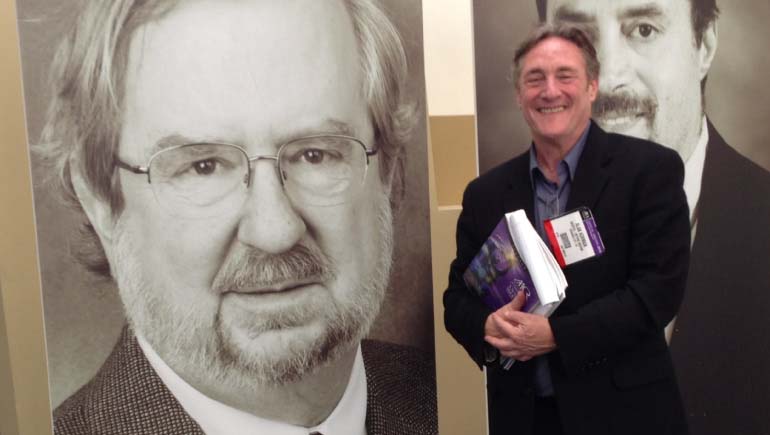Jim Allison: Breakthrough is a new documentary that celebrates Dr. Allison and his scientific discovery that sparked the I-O revolution. The film, which has been showcased at select film festivals around the U.S., features many of the collaborators along the way who helped turn Dr. Allison’s discovery into an impactful medicine for some patients, including Bristol Myers Squibb and two of its recently retired scientists, Alan Korman, vice president of Immuno-Oncology and Nils Lonberg, senior vice president of oncology biology discovery.
Recently retired Bristol Myers Squibb scientists Nils Lonberg (left), senior vice president of oncology biology discovery and Alan Korman, vice president of Immuno-Oncology, are featured in the film “Jim Allison: Breakthrough.”
"Jim Allison: Breakthrough": Celebrating immuno-oncology on the silver screen
Anew era of medicine can often be linked back to significant discoveries that altered the trajectory of science. In the case of immuno-oncology (I-O), one of these discoveries was made by Dr. Jim Allison, a Texan-born scientist whose work leveraging the body’s immune system to combat cancer helped lead to a new class of medicines that changed the cancer treatment landscape.

Alan Korman (right) celebrating Jim Allison, the first winner of the annual AACR-Cancer Research Institute Lloyd J. Old Award in Cancer Immunology.
Accelerating Cancer Research
Jim Allison’s findings revealed that the CTLA-4 protein receptor plays an important role in cancer: taking the “brakes” off T-cells and allowing them to attack tumors. Shortly after that discovery, Korman, who was then at Nexstar, began working with Allison on initial antibody research. Ultimately, Korman and Lonberg together, while at Medarex, partnered with Allison to test a fully human CTLA-4 antibody in humans.
During their tenure at Medarex – and later at Bristol Myers Squibb, which acquired Medarex in 2009 – Korman and Lonberg, in collaboration with a skilled team of researchers, focused on studying the role of inhibitory immune receptors in treating cancer.
However, making checkpoint inhibitors a reality for patients brought its own challenges, including a commitment to lengthy clinical trials to test that the drug was safe and effective for human use. “There was so much that was unknown – from selecting the patient population to cancer types to determining dosing – that we were in nearly constant conversation with an entire community of experts, testing our hypotheses to help us determine the best path forward to take,” adds Lonberg.
Eventually, their persistence paid off and the FDA approved the first checkpoint inhibitor, ushering in a new modality of harnessing the immune system to help treat cancer.
“While many might have given up on the idea, Jim Allison and the team at Bristol Myers Squibb demonstrated an extraordinary resilience and commitment to making this discovery something that would help patients,” says Bill Haney, the film’s director. “Their stubborn refusal to give up – even in the face of intense skepticism – is truly motivating and was an important part of the story we wanted to tell in the film.”
A Lasting Legacy
After the approval of the first checkpoint inhibitor, Korman and Lonberg stayed at Bristol Myers Squibb, leading the company’s biologics drug discovery site in Redwood City, California. There, they continued to make important discoveries about cancer and the immune system, eventually leading to the approval of another checkpoint inhibitor, and providing the foundation for a diverse pipeline of early, investigational I-O assets. In addition, high-profile entities including the Nobel Prize Committee and Science magazine have celebrated immunotherapy as a historic achievement, and today, thousands of cancer patients receive treatment with checkpoint inhibitors.
"I wanted to do something that would have a real impact, and that's what guided me to the particular research path that I chose," adds Korman.
In 2019, Lonberg and Korman both retired from Bristol Myers Squibb after long careers with the company. However, their legacy lives on, having inspired a new generation of researchers to continue exploring the connection between the immune system and cancer.
“It’s almost impossible to put into words the impact that Nils and Alan have had on our company and the field of cancer research,” says Mike Quigley, Vice President and Head, Tumor Microenvironment Modulation Thematic Research Center. “As visionaries and leaders, they have inspired scientists around the world and, at Bristol Myers Squibb, they built teams that are passionate and focused on continuing to discover breakthroughs for patients. It’s a legacy that we’re proud to carry on.”
Jim Allison: Breakthrough celebrates the power of collaboration and the impact individual researchers can have when they come together to fight cancer. Yet with this progress comes the understanding that there are still many patients in need and there is much work left to do. Bristol Myers Squibb remains more determined than ever to solve these challenges, such as better understanding why some tumors are resistant to I-O, and in turn, working to improve outcomes for all patients.
| Learn more about the film at www.breakthroughdoc.com. |



